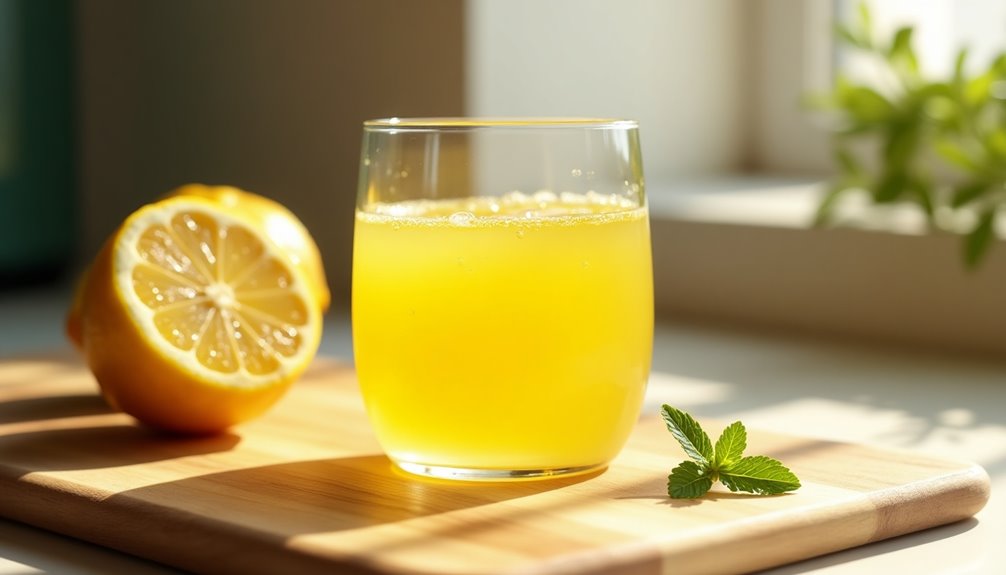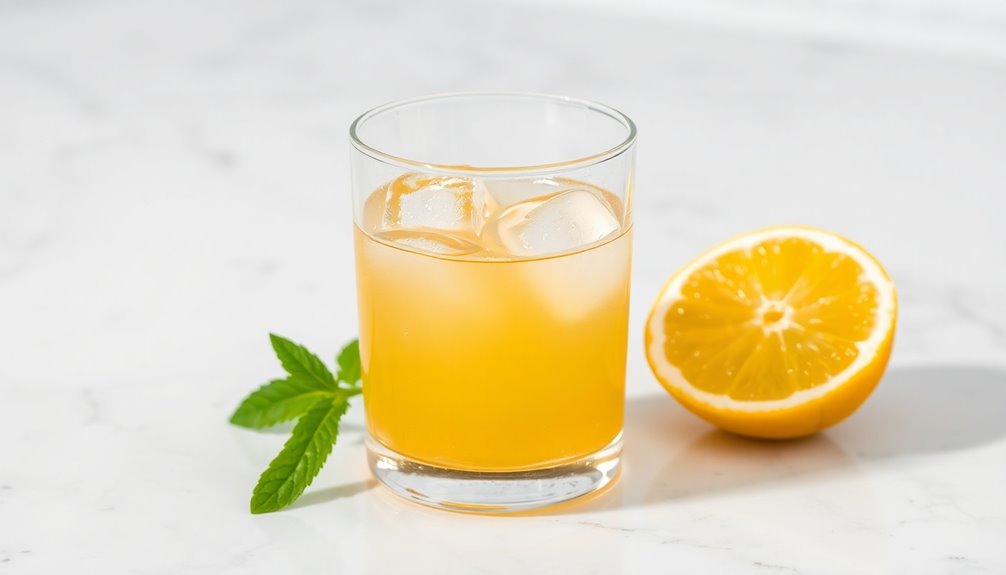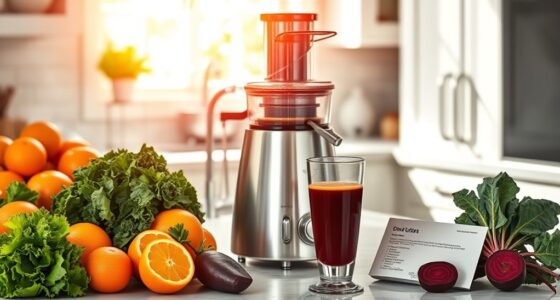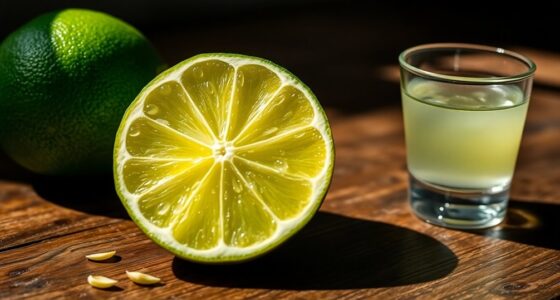Half of a medium lemon usually gives you about 1½ tablespoons of juice. If you're using a large lemon, expect around 2 tablespoons when you cut it in half. Keep in mind that the yield can vary depending on the lemon's size, ripeness, and variety. If you need more juice for your recipe, having an extra lemon on hand is always a good idea. Curious about how to maximize your lemon juice extraction? There's more to explore!
Key Takeaways
- Half of a medium lemon typically yields about 1½ tablespoons of juice.
- A large lemon, when halved, produces around 2 tablespoons of juice.
- Juice yield can vary based on the lemon's size and ripeness.
- Using a citrus juicer maximizes the extraction of juice from the lemon.
- Always have extra lemons on hand for recipes requiring more juice than expected.

Have you ever wondered how much juice you get from half a lemon? It's a common question, especially when you're in the kitchen whipping up your favorite recipes. You might be surprised to learn that half of a medium lemon typically yields about 1½ tablespoons of juice. This amount can vary a bit, depending on the size and ripeness of the lemon, but it gives you a good starting point for your culinary endeavors.
If you're using a large lemon, you can expect that half will yield around 2 tablespoons of juice. That's a bit more than what you'd get from a medium lemon, making it a great option if you need a little extra for a recipe. When you're measuring out fresh lemon juice, it's beneficial to remember that the actual lemon yields can fluctuate based on the variety you have on hand. So if you've got a particularly juicy lemon, you might end up with a bit more than the average.
When you're preparing dishes that call for lemon juice, knowing the right amount is essential. Many recipes can require specific quantities, and it's always a good idea to have an extra lemon on hand just in case. For instance, if you notice that your recipe calls for a certain number of tablespoons and you only have a medium lemon, you might find yourself short if you only squeeze one.
If you're aiming for about ½ cup of juice, three medium lemons will do the trick perfectly. This is especially handy for salad dressings, marinades, or baking.
One thing to keep in mind is that the amount of juice you get can also depend on how you extract that squeezed lemon juice. Using a citrus juicer can really maximize the amount of juice you get, while squeezing by hand might leave you with a little less. You'll want to make sure you're getting every last drop to ensure your dishes are flavorful and bright.
Frequently Asked Questions
How Much of Bottled Lemon Juice Is Equal to 1 Lemon?
When you're looking to substitute bottled lemon juice for fresh, remember that one medium lemon typically yields about 3 tablespoons of juice.
Therefore, if you need the juice from one lemon, you'll want to use approximately 3 tablespoons of bottled lemon juice.
Keep in mind, though, that bottled juice can be more concentrated, so always check the label for any additives or preservatives that might affect the flavor in your dish.
How Much Concentrated Lemon Juice Equals Half a Lemon?
When you're looking to substitute concentrated lemon juice for half a lemon, you should use about 1½ teaspoons of the concentrated juice.
Keep in mind that the flavor can vary, so it's smart to adjust to your taste.
If a recipe specifically calls for fresh lemon juice, measuring the concentrated version is a good idea to ensure you get the right balance of acidity and flavor.
Enjoy experimenting with your dishes!
What Is Half a Cup of Lemon Juice?
You know that feeling when you're making lemonade, and you just can't figure out how much juice you need?
Half a cup of lemon juice is exactly what you're after! You'll typically get this from about 2 medium lemons, yielding around 8 tablespoons.
If you've got larger lemons, just grab about 1½ of those. Always have a few extras on hand, just in case you need a little more zing!
How Much Lemon Juice Is in a Squeeze?
When you squeeze half a lemon, you typically get about 0. 75 to 1 tablespoon of juice, depending on the lemon’s size and ripeness. If you’re planning to use lemon juice for a recipe, you might be wondering how much juice from 2 lemons you can expect to yield. Generally, you can assume that squeezing two medium-sized lemons will provide about 2 to 4 tablespoons of juice. This amount can vary, so it’s always a good idea to have an extra lemon on hand just in case you need more for enhancing the flavor of your dish.
If you need a quick burst of flavor, just a single squeeze can enhance your dish or drink.
If you're cooking or mixing drinks, keep in mind that it's best to have an extra lemon on hand, just in case you need a bit more juice for your recipe.
Conclusion
In short, squeezing half a lemon yields about one to two tablespoons of zesty juice, perfect for adding a splash of flavor to your favorite dishes. So, the next time you need a citrusy kick, remember that this simple squeeze can spice up your meals. Whether you're whipping up a refreshing drink or dressing a delightful salad, half a lemon's juice is a small but stunning secret to savory satisfaction. Enjoy the bright burst of brilliance in your cooking!
Cindy thoroughly researches juicing trends, techniques, and recipes to provide readers with practical advice and inspiration. Her writing style is accessible, engaging, and designed to make complex concepts easy to understand. Cindy’s dedication to promoting the advantages of juicing shines through her work, empowering readers to make positive changes in their lives through the simple act of juicing.
















